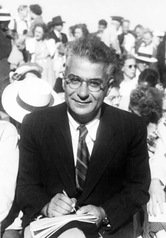
Ilias Venezis
1904–73
The photograph is thought to have been taken in the United States in 1949.
Ilias Venezis, the pen name of Ilias Mellos, was born into an affluent Greek family in the coastal town of Aivali in Asia Minor in 1904. He attended elementary school in Aivali and spent the summers with his several siblings at his maternal grandparents’ farming estate in the Kimindenia mountains. In 1914, at the outbreak of World War II, the family fled to the Greek island of Lesbos to escape the persecution of Christians by the Ottoman State. During these war years, Ilias went to school in Lesbos. His sister Artemis, to whom he was closest, died on the island in 1918, probably of the Spanish flu. The following year, at the beginning of the Greco-Turkish War, when Greece controlled western Anatolia, he returned to Aivali with his family and completed his secondary education there in 1921.
In September of 1922, after the overwhelming defeat of the Greek army, Ilias, still a teenager, was taken prisoner by the Turks and force-marched into the interior of Turkey in one of the infamous labour battalions. Of the 3000 Greek men taken then from Aivali for slave labour, he was one of only 23 to survive. He was released after fourteen months in captivity, managed to join his family in Lesbos in 1923 and began working to support them. Encouraged by the Greek writer Stratis Myrivilis (1897–1969), he wrote an account of his ordeal as a Turkish prisoner. It was first published in installments in the island’s weekly newspaper and later, in 1931, was published as a book with the title Number 31328. The book won great acclaim and established Venezis’ reputation as a literary figure and leading member of what became known as the ‘generation of the 30s’, a group of Greek intellectuals, writers, poets, artists, critics, who made their debut in that decade and are regarded as responsible for introducing modernism into Greek literature and art.
In 1932 Venezis settled in Athens where he worked for the Bank of Greece until his retirement in 1957. In 1938 he married Stavritsa Molyviati, and the following year their daughter, Anna, was born. The year 1939 also saw the publication of his second major work, the novel Serenity, which tells the story of a group of Asia Minor refugees trying to start a new life on a barren piece of land given to them by the Greek government. This book won both the National Literature Prize and that of the Athens Academy.
The German occupation of Greece began in April of 1941 and lasted until October 1944, during which time thousands of Greeks died of starvation and from Nazi reprisals against civilians. It was in these calamitous years that Venezis wrote Land of Aeolia. On October 28, 1943, he took part in a clandestine gathering in the Bank of Greece convened to honour the memory of those who had died fighting the Italian fascists in Albania in 1940. But the meeting had been betrayed to the SS, who arrested a number of people, including Venezis. While he awaited execution, he nonetheless gave instructions for the publication of Land of Aeolia. At the last minute, protests and petitions from friends and supporters, including Archbishop Damaskinos, somehow reached Berlin and led to his release after eighteen horrific days and nights in German hands. His 1945 play Block C portrays this ordeal. Land of Aeolia was published almost directly after his release, in December of 1943. The initial print run of 5,000 copies sold out in two weeks. It was reprinted immediately and has remained in print continuously ever since. It is presently in its 69th edition.
Venezis wrote prolifically throughout his life: newspaper articles, short stories, novels, histories, and travelogues. In 1957 he was elected to the Athens Academy, the first Greek writer from Asia Minor to attain this honour. In the mid 1960s, he built a house in Lesbos with a view to his beloved Kimindenia mountains, to which he would never return. He died in Athens in 1973.